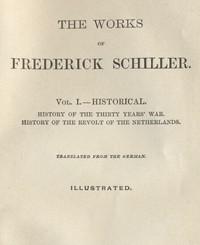Read this ebook for free! No credit card needed, absolutely nothing to pay.
Words: 30745 in 5 pages
This is an ebook sharing website. You can read the uploaded ebooks for free here. No credit cards needed, nothing to pay. If you want to own a digital copy of the ebook, or want to read offline with your favorite ebook-reader, then you can choose to buy and download the ebook.


: History of the Revolt of the Netherlands — Volume 01 by Schiller Friedrich - Netherlands History Eighty Years' War 1568-1648; Huguenots
INTRODUCTION
Many years ago, when I read the History of the Belgian Revolution in Watson's excellent work, I was seized with an enthusiasm which political events but rarely excite. On further reflection I felt that this enthusiastic feeling had arisen less from the book itself than from the ardent workings of my own imagination, which had imparted to the recorded materials the particular form that so fascinated me. These imaginations, therefore, I felt a wish to fix, to multiply, and to strengthen; these exalted sentiments I was anxious to extend by communicating them to others. This was my principal motive for commencing the present history, my only vocation to write it. The execution of this design carried me farther than in the beginning I had expected. A closer acquaintance with my materials enabled me to discover defects previously unnoticed, long waste tracts to be filled up, apparent contradictions to be reconciled, and isolated facts to be brought into connection with the rest of the subject. Not so much with the view of enriching my history with new facts as of seeking a key to old ones, I betook myself to the original sources, and thus what was originally intended to be only a general outline expanded under my hands into an elaborate history. The first part, which concludes with the Duchess of Parma's departure from the Netherlands, must be looked upon only as the introduction to the history of the Revolution itself, which did not come to an open outbreak till the government of her successor. I have bestowed the more care and attention upon this introductory period the more the generality of writers who had previously treated of it seemed to me deficient in these very qualities. Moreover, it is in my opinion the more important as being the root and source of all the subsequent events. If, then, the first volume should appear to any as barren in important incident, dwelling prolixly on trifles, or, rather, should seem at first sight profuse of reflections, and in general tediously minute, it must be remembered that it was precisely out of small beginnings that the Revolution was gradually developed; and that all the great results which follow sprang out of a countless number of trifling and little circumstances.
A nation like the one before us invariably takes its first steps with doubts and uncertainty, to move afterwards only the more rapidly for its previous hesitation. I proposed, therefore, to follow the same method in describing this rebellion. The longer the reader delays on the introduction the more familiar he becomes with the actors in this history, and the scene in which they took a part, so much the more rapidly and unerringly shall I be able to lead him through the subsequent periods, where the accumulation of materials will forbid a slowness of step or minuteness of attention.
As for the authorities of our history there is not so much cause to complain of their paucity as of their extreme abundance, since it is indispensable to read them all to obtain that clear view of the whole subject to which the perusal of a part, however large, is always prejudicial. From the unequal, partial, and often contradictory narratives of the same occurrences it is often extremely difficult to seize the truth, which in all is alike partly concealed and to be found complete in none. In this first volume, besides de Thou, Strada, Reyd, Grotius, Meteren, Burgundius, Meursius, Bentivoglio, and some moderns, the Memoirs of Counsellor Hopper, the life and correspondence of his friend Viglius, the records of the trials of the Counts of Hoorne and Egmont, the defence of the Prince of Orange, and some few others have been my guides. I must here acknowledge my obligations to a work compiled with much industry and critical acumen, and written with singular truthfulness and impartiality. I allude to the general history of the United Netherlands which was published in Holland during the present century. Besides many original documents which I could not otherwise have had access to, it has abstracted all that is valuable in the excellent works of Bos, Hooft, Brandt, Le Clerc, which either were impossible for me to procure or were not available to my use, as being written in Dutch, which I do not understand. An otherwise ordinary writer, Richard Dinoth, has also been of service to me by the many extracts he gives from the pamphlets of the day, which have been long lost. I have in vain endeavored to procure the correspondence of Cardinal Granvella, which also would no doubt have thrown much light upon the history of these times. The lately published work on the Spanish Inquisition by my excellent countryman, Professor Spittler of Gottingen, reached me too late for its sagacious and important contents to be available for my purpose.
The more I am convinced of the importance of the French history, the more I lament that it was not in my power to study, as I could have wished, its copious annals in the original sources and contemporary documents, and to reproduce it abstracted of the form in which it was transmitted to me by the more intelligent of my predecessors, and thereby emancipate myself from the influence which every talented author exercises more or less upon his readers. But to effect this the work of a few years must have become the labor of a life. My aim in making this attempt will be more than attained if it should convince a portion of the reading public of the possibility of writing a history with historic truth without making a trial of patience to the reader; and if it should extort from another portion the confession that history can borrow from a cognate art without thereby, of necessity, becoming a romance.
WEIMAR, Michaelmas Fair, 1788.
INTRODUCTION.
Of those important political events which make the sixteenth century to take rank among the brightest of the world's epochs, the foundation of the freedom of the Netherlands appears to me one of the most remarkable. If the glittering exploits of ambition and the pernicious lust of power claim our admiration, how much more so should an event in which oppressed humanity struggled for its noblest rights, where with the good cause unwonted powers were united, and the resources of resolute despair triumphed in unequal contest over the terrible arts of tyranny.
Great and encouraging is the reflection that there is a resource left us against the arrogant usurpations of despotic power; that its best- contrived plans against the liberty of mankind may be frustrated; that resolute opposition can weaken even the outstretched arm of tyranny; and that heroic perseverance can eventually exhaust its fearful resources. Never did this truth affect me so sensibly as in tracing the history of that memorable rebellion which forever severed the United Netherlands from the Spanish Crown. Therefore I thought it not unworth the while to attempt to exhibit to the world this grand memorial of social union, in the hope that it may awaken in the breast of my reader a spirit-stirring consciousness of his own powers, and give a new and irrefragible example of what in a good cause men may both dare and venture, and what by union they may accomplish. It is not the extraordinary or heroic features of this event that induce me to describe it. The annals of the world record perhaps many similar enterprises, which may have been even bolder in the conception and more brilliant in the execution. Some states have fallen after a nobler struggle; others have risen with more exalted strides. Nor are we here to look for eminent heroes, colossal talents, or those marvellous exploits which the history of past times presents in such rich abundance. Those times are gone; such men are no more. In the soft lap of refinement we have suffered the energetic powers to become enervate which those ages called into action and rendered indispensable. With admiring awe we wonder at these gigantic images of the past as a feeble old man gazes on the athletic sports of youth.
Not so, however, in the history before us. The people here presented to our notice were the most peaceful in our quarter of the globe, and less capable than their neighbors of that heroic spirit which stamps a lofty character even on the most insignificant actions. The pressure of circumstances with its peculiar influence surprised them and forced a transitory greatness upon them, which they never could have possessed and perhaps will never possess again. It is, indeed, exactly this want of heroic grandeur which renders this event peculiarly instructive; and while others aim at showing the superiority of genius over chance, I shall here paint a scene where necessity creates genius and accident makes heroes.
For such acts no forgiveness remained; the republic became formidable only because it was impossible for her to retrace her steps. But factions distracted her within; without, her terrible element, the sea itself, leaguing with her oppressors, threatened her very infancy with a premature grave. She felt herself succumb to the superior force of the enemy, and cast herself a suppliant before the most powerful thrones of Europe, begging them to accept a dominion which she herself could no longer protect. At last, but with difficulty--so despised at first was this state that even the rapacity of foreign monarchs spurned her opening bloom--a stranger deigned to accept their importunate offer of a dangerous crown. New hopes began to revive her sinking courage; but in this new father of his country destiny gave her a traitor, and in the critical emergency, when the foe was in full force before her very gates, Charles of Anjou invaded the liberties which he had been called to protect. In the midst of the tempest, too, the assassin's hand tore the steersman from the helm, and with William of Orange the career of the infant republic was seemingly at an end, and all her guardian angels fled. But the ship continued to scud along before the storm, and the swelling canvas carried her safe without the pilot's help.
This improbable turn of affairs seems to border on a miracle; many circumstances, however, combined to break the power of Philip, and to favor the progress of the infant state. Had the whole weight of his power fallen on the United Provinces there had been no hope for their religion or their liberty. His own ambition, by tempting him to divide his strength, came to the aid of their weakness. The expensive policy of maintaining traitors in every cabinet of Europe; the support of the League in France; the revolt of the Moors in Granada; the conquest of Portugal, and the magnificent fabric of the Escurial, drained at last his apparently inexhaustible treasury, and prevented his acting in the field with spirit and energy. The German and Italian troops, whom the hope of gain alone allured to his banner, mutinied when he could no longer pay them, and faithlessly abandoned their leaders in the decisive moment of action. These terrible instruments of oppression now turned their dangerous power against their employer, and wreaked their vindictive rage on the provinces which remained faithful to him. The unfortunate armament against England, on which, like a desperate gamester, he had staked the whole strength of his kingdom, completed his ruin; with the armada sank the wealth of the two Indies, and the flower of Spanish chivalry.
Free books android app tbrJar TBR JAR Read Free books online gutenberg
More posts by @FreeBooks

: The Thirty Years War — Complete by Schiller Friedrich Morrison A J W Alexander James William Translator - Thirty Years' War 1618-1648; Europe History 1517-1648; Wallenstein Albrecht Wenzel Eusebius von Herzog von Friedland 1583-1634






